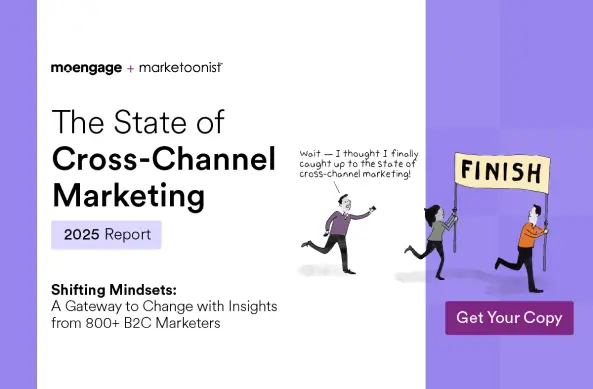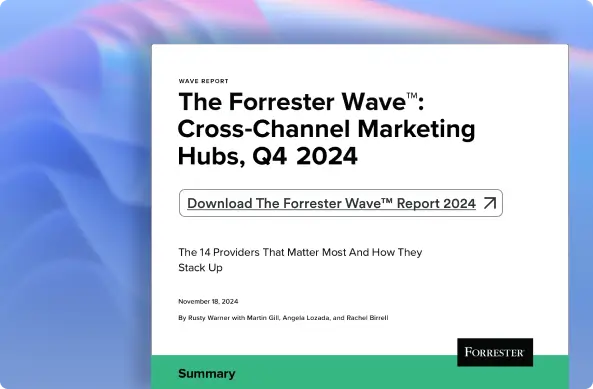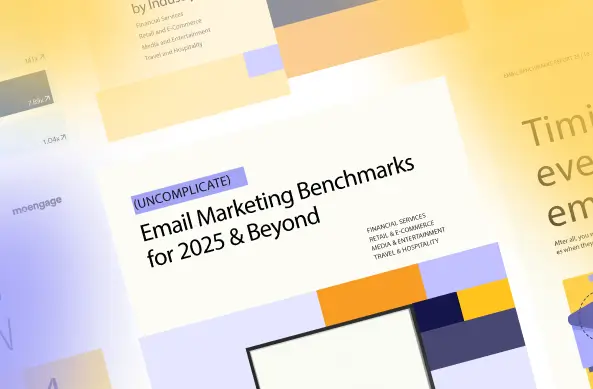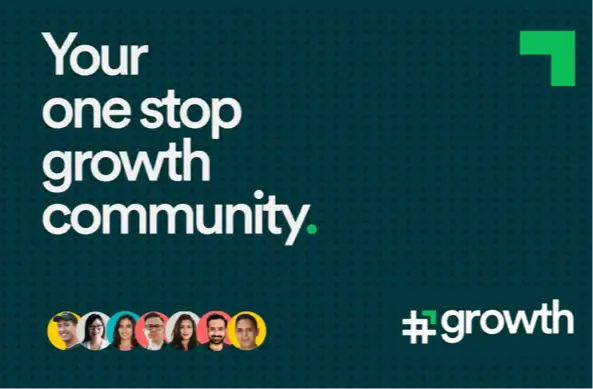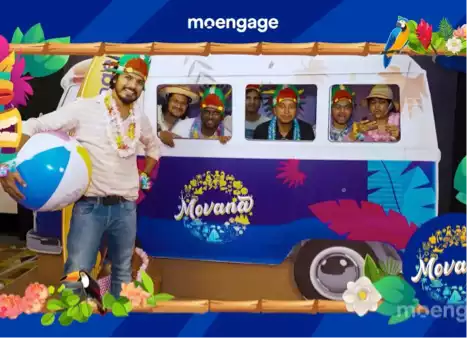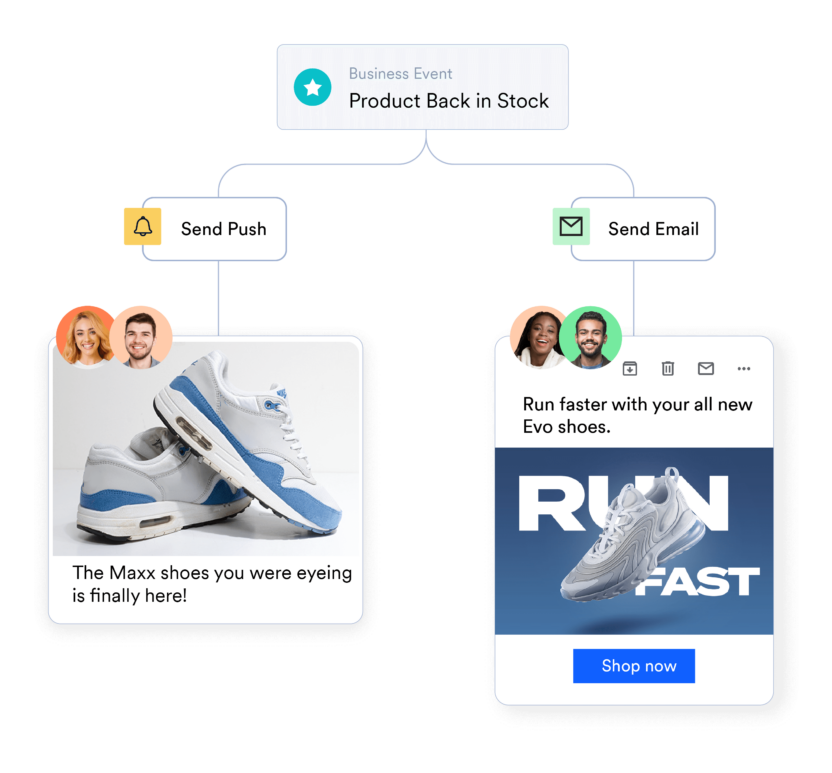Introducing MoEngage Business Events: Amplify Customer Engagement Based On Business Activity
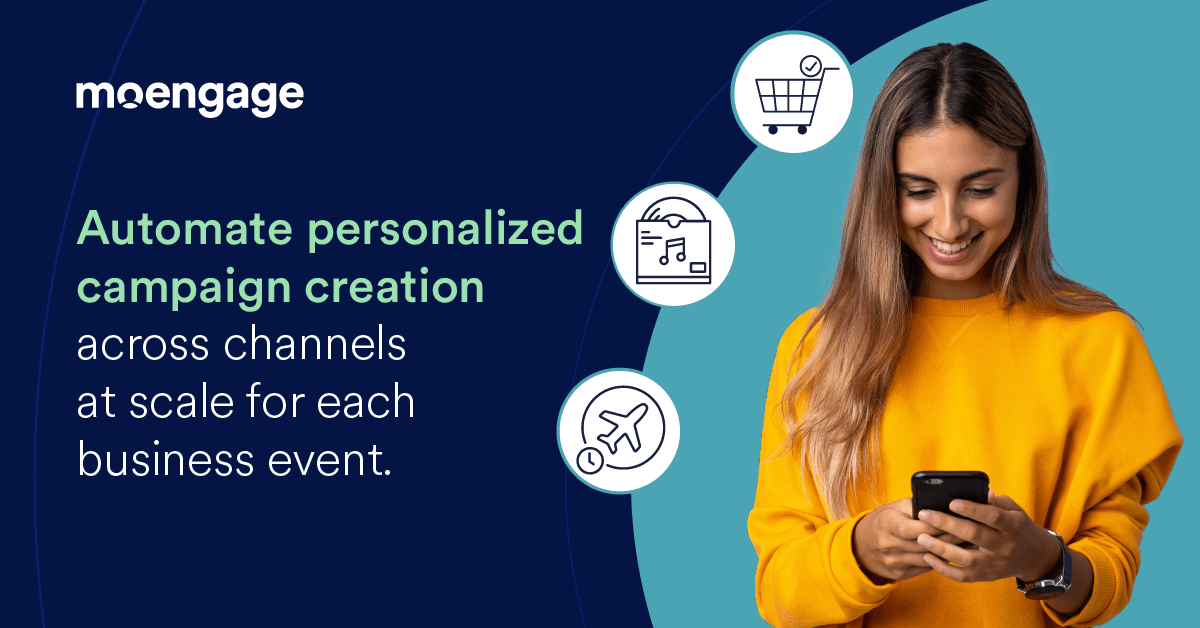
Reading Time: 6 minutes
Traditional customer engagement strategies usually focus on customer behavior and actions taken on marketing campaigns. These customer events or activities taken by the customers could range from adding to cart, cart abandons, browsing drop-offs, or making a purchase. Marketers trigger communication based on these customer actions.
However, marketers can leverage another critical side of the same coin to amplify engagement and conversions—the business side of events that need customers to take specific actions.
These events are events that happen at the business end, based on which campaigns can be planned and deployed. These events can range from new app releases and updates to new show releases, back-in-stock product communication, and more. At MoEngage, we call these Business Events.
Business events help businesses engage their customers based on the occurrence of an event on the business end.
However, creating campaigns and workflows based on these business occurrences’ can be cumbersome, especially when scaling marketing efforts. How? For a shopping brand, for instance, creating new campaigns for every back-in-stock alert for thousands of products and product categories is exhausting. The same goes for an OTT brand—multiple new albums or shows are released every day. Creating, measuring, and analyzing new campaigns for each can become complex.
Introducing MoEngage’s game-changing feature that will revolutionize how you engage and interact with your customers—MoEngage Business Events.
Let’s dive into what MoEngage Business Events is all about and why it matters.
Why Business Events Is The Need Of The Hour For Busy Marketers?
Business Events helps brands achieve key business goals and optimal outcomes efficiently and effectively. For instance, you can run an automated and contextual seasonal sale campaign with Business Events to improve conversion rates and enhance customer engagement and experience. This can look like personalized and relevant product categories on discounts for segments that have previously purchased or browsed a product or category and communicating the applicable discount available for grabs.
Let’s take a look at the reasons why you should communicate key business occurrences to your customers.
Create better customer experiences and improved engagement
Business Events help improve overall customer communications and experience by facilitating personalized and contextual omnichannel customer communication with relevant segmentation.
For a travel app, a timely notification about a flight delay for customers traveling on that specific flight could help them stay updated and informed, saving them time.
Communicate business-related events to customers seamlessly
Brands can communicate with customers about new changes in offerings. For an OTT brand, this could be about a new show release that a customer segment would be interested in watching. For an E-commerce brand, a relevant and timely alert about a price drop for a product category for appropriate segments would boost purchases.
Improve conversions and revenue
An E-commerce brand can run a campaign for products and different categories that are back in stock for segments that have previously shown interest in being notified of a product that comes back in stock within one campaign. This not only improves the relevancy for the customer but also nudges them to purchase and engage with your brand. Or an OTT app can notify relevant customers about a discount on subscription packages or a new subscription package up for grabs for a limited time to boost conversions and revenue.
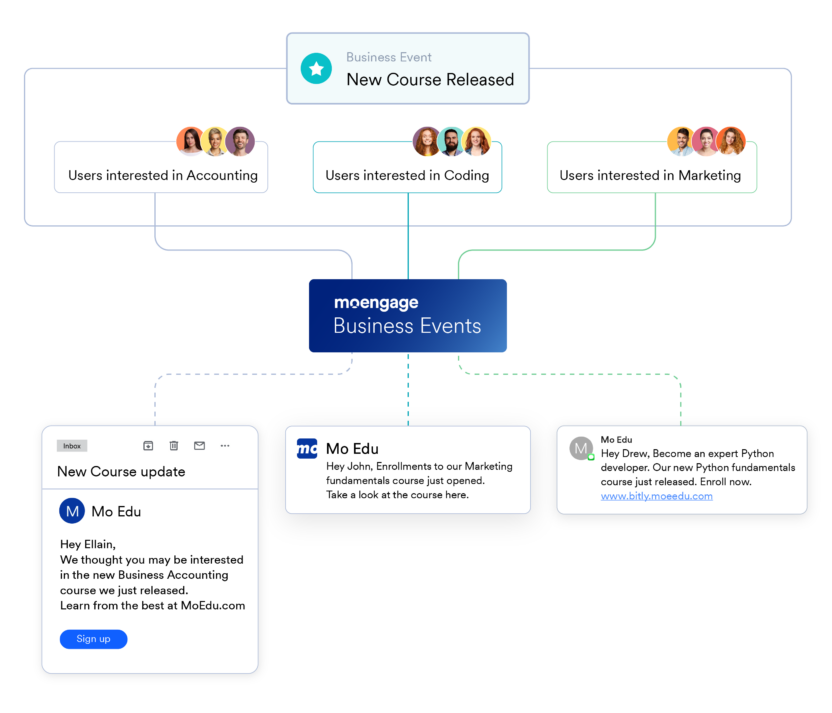
Win back customers
Brands can now automate win-back campaigns with Business Events! How? A travel app can send a notification about a flight price drop for a route a customer was previously browsing. Or an OTT app can nudge customers to upgrade by alerting them about the release of an eagerly awaited show.
Build stronger customer loyalty and boost retention rates
When customers receive personalized, contextual, and relevant communication from their favorite brands, engagement, customer loyalty, and retention rates improve. With Business Events, marketers can hyper-personalize their business event campaigns with content based on different parameters.
For instance, a shopping brand can personalize new product recommendations and relevant discounts on those products for interested customer segments based on location or previous purchase history. Or a BFSI brand can share an update about new government rules for customer segments that have signed up for a trading account or a credit card based on their income package.
How MoEngage Business Events Helps You Achieve Key Business Goals
Mapping your business events
Creating multiple campaigns for every business event, like a price drop alert, back-in-stock campaign or new product categories added, can become a time-consuming process. To make it easier, with Business Events, you’ll need to identify all the business occurrences you want to set up and map all of them to MoEngage. Once the setup is complete, you can trigger multiple campaigns for different business events within minutes for future campaigns by simply selecting the business event for a customer segment.
Dynamically segment customers
Sending relevant communication is vital to delivering a better customer experience. With MoEngage Business Events, you can dynamically segment customers and send them only relevant business-related communication. This way, customers are not spammed with notifications about new show releases, flight changes, or product back-in-stock communication that are irrelevant to them. This improves experience, engagement, and campaign performance.
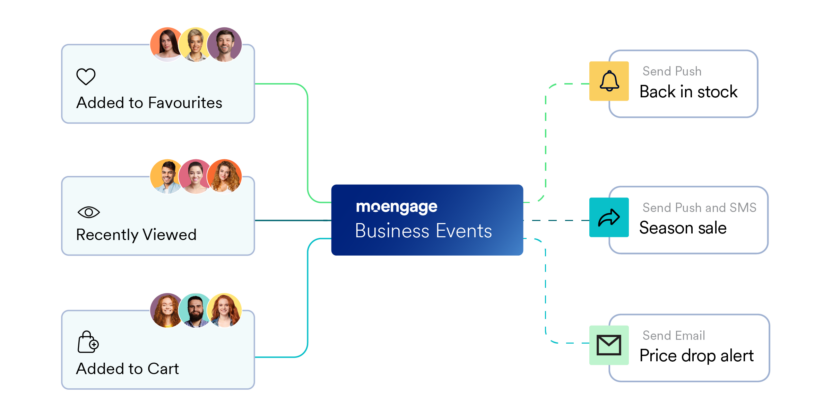
Personalization at scale
Marketers can hyper-personalize their business event campaigns with content according to the product, series, brand, and more! They can also add personalization attributes such as location, names, previously purchased product names, and more to deliver a hyper-personalized experience.
Automate campaigns quickly
As marketing teams evolve and become innovative, the need for effective and efficient customer communication increases. But this also increases the need for automation to scale marketing efforts. Moreover, business needs change, which also requires changes in campaigns. Business Events helps automate repetitive tasks quickly, with a seamless setup. For instance, you don’t need to trigger multiple campaigns for multiple customer segments for each business event for hundreds of products and categories. It’s all automated for you!
For example, after the initial mapping has been set up, a shopping brand can trigger multiple back-in-stock alerts for multiple customer segments for specific products or categories in minutes!
Analytics for campaign optimization
Once Business Event campaigns are set up and published, you can view how your campaigns perform against campaign goals. These stats help understand which product, show, series, etc., receive customers’ maximum interest and engagement.
How To Use MoEngage’s Business Events To Create Automated Personalized Marketing Campaigns At Scale
Retail/E-commerce
- Notify customers when out-of-stock products are back in stock.
- A retail brand that regularly conducts seasonal sales for specific categories can communicate these price drop alerts to only those customers who have previously shown interest in the category or have shopped in the category before.
Streaming and OTT
- Notify viewers about new series or episodes in their preferred genres.
- A music streaming app can automatically send a new notification to subscribers as soon as an artist releases a new album. Subscribers can receive a push, SMS, or email notification if they have recently downloaded or favored five or more songs from the artist.
MoEngage Business Events can automate this customer communication. When the business event (album release) occurs, MoEngage captures it and sends a personalized notification to customers who meet the criteria (5 or more downloads or favorites). This approach can be applied to multiple album releases across millions of customers using MoEngage Business Events.
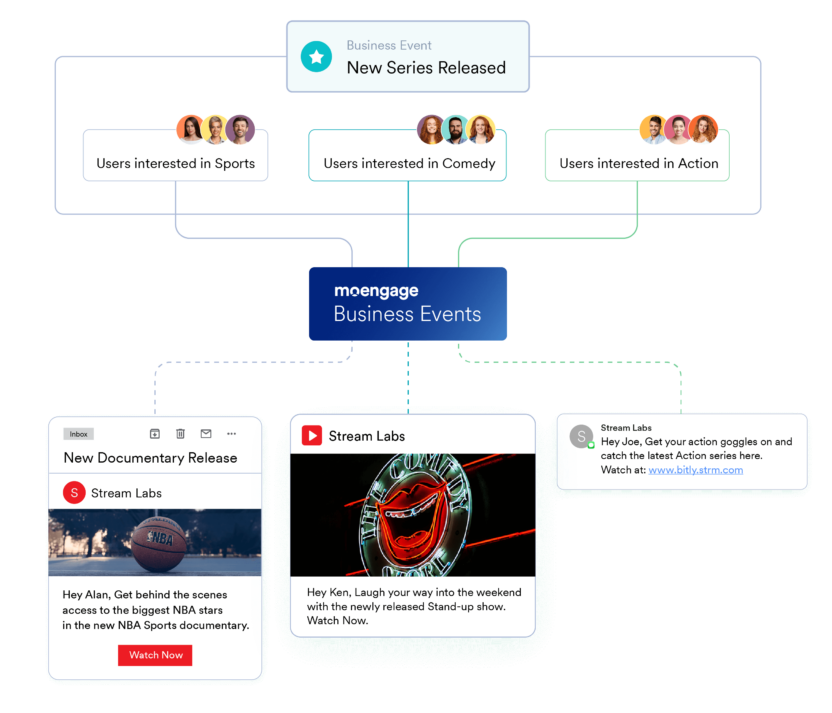
BFSI
- Alert customers about limited-time investment opportunities.
- A fintech investment app that regularly opens up its investment window for a limited time can notify relevant customers about when this window opens. You can also send this information to customers who have previously expressed interest in investing in a particular fund only.
Travel
An airline brand can communicate critical business changes to customers, such as flight delays or rescheduling. Instead of manually creating these campaigns each time a business change occurs, you can instead use MoEngage Business Event campaigns to communicate such changes to customers as they happen.
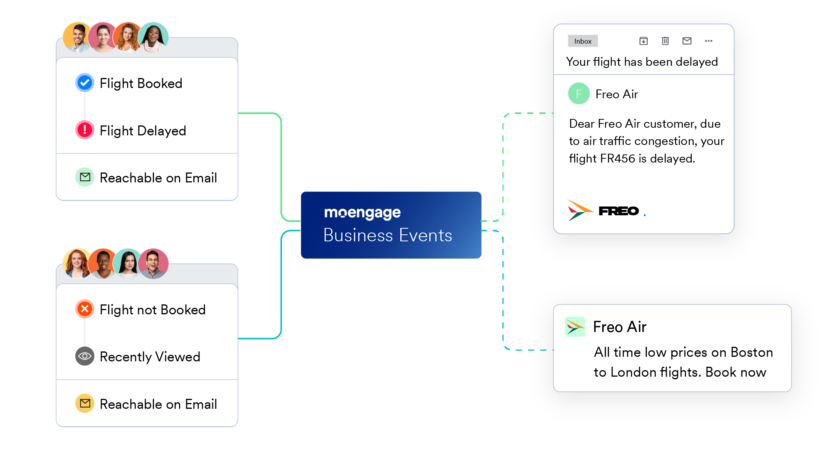
Job Portals
- Based on a jobseeker activity, nudge recruiters to take necessary actions.
- Communicate such activities as they happen to recruiters using Business Event campaigns.
Wrapping Up
Marketers have many jobs to do—creating personalized customer experiences, running relevant campaigns, and analyzing accurate insights. Automation ensures that we can do all this at scale without compromising on critical aspects.
Business Events empowers you to create and automate relevant marketing campaigns while ensuring that your critical metrics keep improving. What’s more, you can leverage Business Events to add an additional layer of customer engagement based on the business side of events that customers would find relevant or would be interested in—like back-in-stock alerts for their favorite products or brands!
Are you excited to learn more about Business Events? If you’re an existing customer, please contact your favorite customer success manager. You can talk to our experts here if you’re a newbie here.

